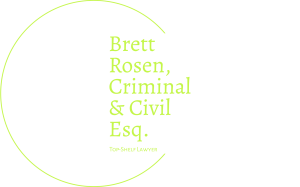Veterans Court in Union County, NJ: A Guide for Veterans Facing Criminal Charges

Are you a veteran in Union County, NJ facing criminal charges? You’re not alone, and there’s help available. Veterans Court offers a specialized path for veterans navigating the legal system, focusing on rehabilitation and support rather than traditional prosecution. This page, provided by Brett M. Rosen, Esq., aims to provide comprehensive information about Veterans Court in Union County, NJ.
What is Veterans Court?
Veterans Court is a specialized program within the New Jersey court system designed to address the unique challenges faced by veterans involved in the criminal justice system. It recognizes that many veterans struggle with mental health issues, substance abuse, and other challenges stemming from their service. Instead of solely focusing on punishment, Veterans Court emphasizes treatment, rehabilitation, and reintegration into civilian life. It’s a collaborative effort involving the court, prosecutors, defense attorneys, probation officers, and veteran mentors, all working together to support the veteran’s recovery and success.
Who is Eligible for Veterans Court in Union County?
Eligibility for Veterans Court typically requires meeting specific criteria, including:
- Veteran Status: Honorable discharge from the U.S. Armed Forces (including Reserves and National Guard).
- Residency: Residency in Union County, NJ.
- Criminal Charges: Generally, non-violent offenses are considered. Violent crimes may be eligible in some circumstances, but each case is reviewed individually.
- Mental Health or Substance Abuse Diagnosis: A diagnosed mental health condition (like PTSD, anxiety, depression) or substance abuse issue that contributed to the criminal behavior.
- Willingness to Participate: Voluntary participation and a commitment to the program’s requirements are essential.
Benefits of Veterans Court for Veterans
Participating in Veterans Court offers numerous potential benefits:
- Reduced Recidivism: Veterans Court programs have demonstrated lower rates of re-offending compared to traditional court processing.
- Improved Mental Health & Well-being: Access to specialized mental health treatment, counseling, and support groups tailored to veterans’ needs.
- Substance Abuse Treatment: Comprehensive substance abuse evaluation, treatment, and ongoing support to address addiction issues.
- Stable Housing: Assistance in securing and maintaining stable housing, a crucial factor in successful reintegration.
- Employment Opportunities: Support in finding and maintaining meaningful employment, including job training and placement services.
- Stronger Family Relationships: Opportunities to rebuild and strengthen family connections through counseling and support programs.
- Connection to Veteran Services: Access to a network of veteran-specific resources, including healthcare, disability benefits, and peer support groups.
- Avoidance of Traditional Conviction: Successful completion of the program may result in reduced or dismissed charges, avoiding a traditional criminal record.
How to Apply for Veterans Court in Union County
The application process typically involves the following steps:
- Consult with an Attorney: Contact Brett M. Rosen, Esq., or another qualified attorney experienced in Veterans Court proceedings. An attorney can assess your eligibility and guide you through the process.
- Assessment and Referral: An initial assessment will be conducted to determine your eligibility and needs. Referrals can be made by your attorney, the prosecutor’s office, or through self-referral.
- Court Application: A formal application must be submitted to the Veterans Court.
- Court Review and Acceptance: The Veterans Court team will review your application and determine your suitability for the program.
- Program Participation: Upon acceptance, you will be required to adhere to a strict program of treatment, supervision, and court appearances.
Frequently Asked Questions (FAQs)
- Q: Will I have to go to jail? A: While jail time is possible, the focus of Veterans Court is on treatment and rehabilitation. Successful completion of the program can often help avoid jail time.
- Q: How long does the program last? A: The length of the program varies depending on individual needs and progress, typically ranging from 18 to 36 months.
- Q: What happens if I violate the program requirements? A: Violations can result in sanctions, including increased supervision, additional treatment, or even removal from the program.
- Q: Can I participate in Veterans Court if I have a dishonorable discharge? A: Generally, an honorable discharge is required. However, certain cases with other-than-honorable discharges may be considered on a case-by-case basis. Consult with an attorney.
Contact Us:
If you are a veteran in Union County, NJ facing criminal charges, Brett M. Rosen, Esq. can help. We are dedicated to protecting the rights of veterans and guiding them through the Veterans Court process. Contact us today for a confidential consultation. 908-312-0368 & brett@nynjcriminalcivilesq.com
Disclaimer: This information is for educational purposes only and does not constitute legal advice. It is essential to consult with a qualified attorney regarding your specific legal situation.
Disclosure: Prior results do not guarantee a similar outcome. This testimonial or endorsement does not constitute a guarantee, warranty, or prediction regarding the outcome of your legal matter.
